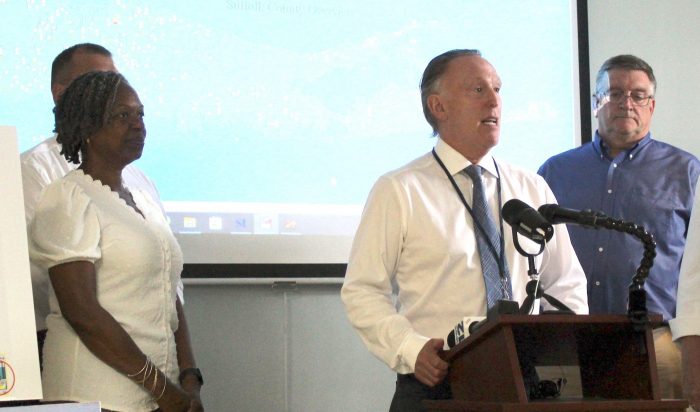SCWA ‘pleading with the public’ to conserve water

By Raymond Janis
Tucked away on 5th Avenue in Bay Shore, just south of Sunrise Highway, lies the heart of the Suffolk County Water Authority’s operations.
Data streams into this control center around the clock, funneling information from each of the water authority’s myriad wells and pumps from Melville to Montauk. Amid these summer months, that data indicates Suffolk residents are overloading the system through excessive water consumption.
SCWA officials held a press conference at this site Thursday, July 13, sending a singular message to Suffolk County residents: Conserve water.
“We’re pleading to the public at this point to conserve,” said Charles Lefkowitz, chair of the SCWA Board. “We need all the residents to participate in these conservation efforts.”
Lefkowitz attributes the problems with overpumping primarily to irresponsible irrigation practices. “It starts with the irrigation systems,” he said. “Lawns do not need to be watered every single day.”
Joe Pokorny, deputy CEO for operations at SCWA, indicated that county residents are pumping 500,000 gallons per minute during peak irrigation periods during this summer season. By contrast, peak levels are around 100,000 gallons per minute during non-irrigation months.
“This time of year, people are using about five times as much water during the peak as they would in the off period,” he said.
He added that if residents en masse do not begin to curtail their water consumption, they may begin to experience issues with water pressure. This phenomenon impacts those on the East End most markedly.
“When demand outstrips supply, our tank levels fall,” the deputy CEO noted. “When our tank levels fall, the pressures in our system go down. And if the pressure in your water system goes down, the people that are irrigating are not going to get much irrigation on their lawns at all.”
To counteract these challenges, SCWA is encouraging residents to adopt an odd-even watering pattern, that is, irrigating their lawns every other day.
“This will theoretically divide up the water usage by half,” Pokorny indicated. “That will then allow more people to water during those periods … and they will have green lawns as a result.”
But the problems associated with overconsumption continue beyond the front lawn. With too much stress on the tanks and diminished water pressure, there could be public safety repercussions as well.
“If firefighters need to fight a fire and a water tank is low, that means there’s less water available for fighting fires,” he added.
Along with the odd-even irrigation schedule, Lefkowitz implored residents to avoid watering during the peak hours between 10 a.m. and 4 p.m. The SCWA Board chair also announced that it has instituted up to $250 per year in “water credits” for residents who use rain sensors, irrigation timers, leak detection and compliant faucet heads.
To learn about SCWA’s water credits program, visit www.scwa.com.






